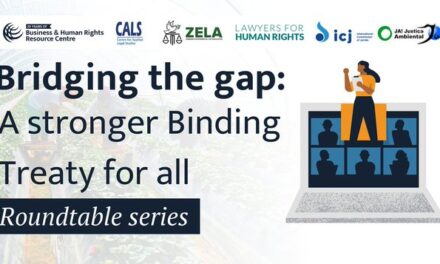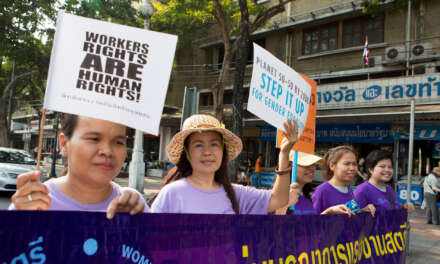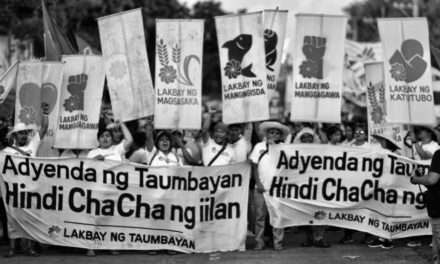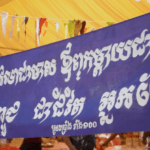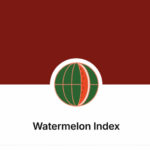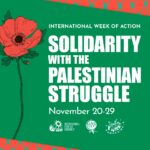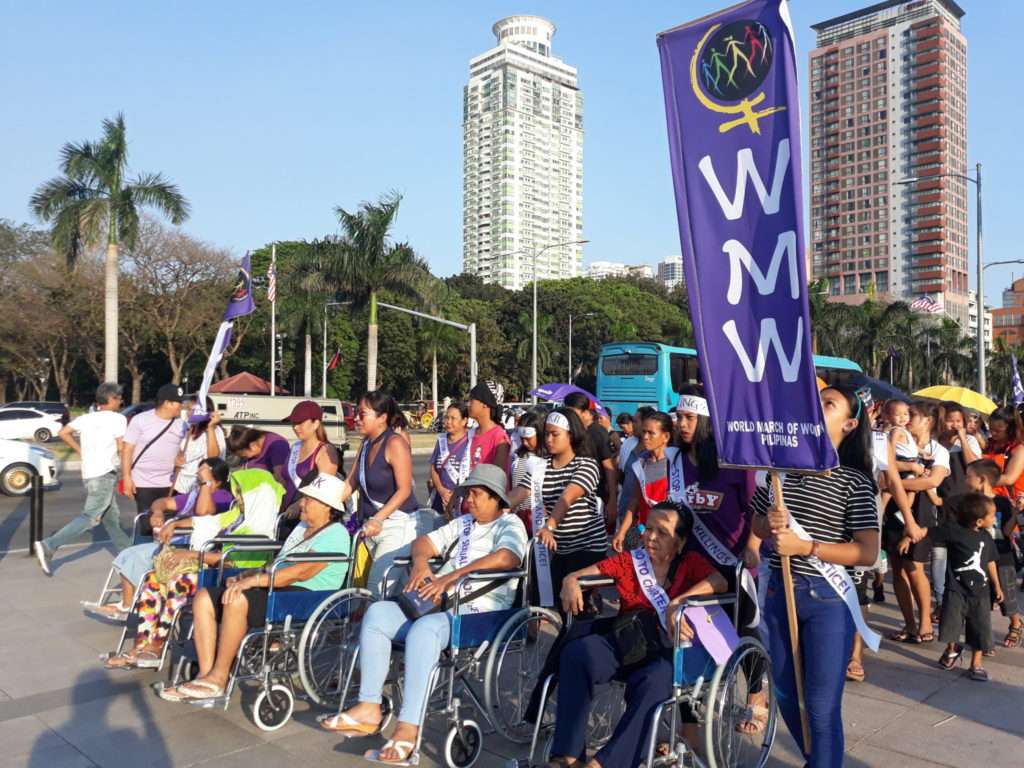
Women’s rights advocates from different organizations converge on Rizal Park to demand respect for women’s rights and the recognition and resolution of their issues. International Women’s Day. 2019 March 8. Manila, Philippines. Photo by Galileo de Guzman Castillo.
Bianca Martinez
Even before Duterte became President, women were already burdened with multiple layers of gender and class oppression. Under the administration of Duterte—a macho and misogynistic strongman with a penchant for neoliberalism—the situation for women has taken a turn for the worse as Duterte and his allies have vehemently disrespected, disparaged, and silenced them while systematically deprived poor women of opportunities and resources that would have allowed them to free themselves from poverty.
The President’s misogynistic and sexist pronouncements have served to reinforce patriarchal social relations. Although Malacañang has consistently downplayed the harmful consequences of these remarks on women, studies have shown that exposure to sexist remarks does not only encourage men’s tolerance of discrimination against women, but also increases their propensity to commit sexual violence against women and to blame rape victims for their victimization.[1] Such remarks pack a more powerful punch when they come from an authoritative figure like Duterte, given that his role as President provides him with significant influence over how men and women learn behavior and attitudes considered appropriate for their sex.
Meanwhile, by aggravating poverty, the Duterte administration’s anti-poor and pro-corporate neoliberal policies have added weight to women’s already multiple burdens. Indeed, poverty has a more grievous impact on women as compared to men, given that deeply entrenched patriarchal conditions make it even more difficult for them to transcend conditions of poverty. Furthermore, the worsening of poverty has also made women more vulnerable to sex trafficking and other forms of abuse.
Duterte’s despotic and patriarchal style of governance—which is best exemplified by his hostility towards human rights, women’s rights, and democratic institutions as well as his offensive against strong female figures who are critical of the government—has delegitimized the women’s struggle in the eyes of the public and reduced the spaces where women can resist and advance their rights and interests.
However, while Duterte has presented a major setback to the women’s movement, our campaigns must not focus on denouncing Duterte alone, for his machismo, sexism, and misogyny do not exist in a vacuum. Rather, they derive their power and legitimacy from patriarchal values and institutions that have long been entrenched in our society. In turn, these values and institutions are reinforced by personalities like Duterte. Therefore, taking a stand against one would necessitate denouncing the other.
The way forward for women within a patriarchal society buttressed by a misogynistic, authoritarian, and neoliberal administration is to continue strengthening the women’s movement by molding younger women’s rights activists and immersing ourselves in the lives of women from the grassroots in order to raise their awareness of the oppressive conditions endured by the sector, understand their struggle, and forge strong and lasting comradeships towards the common goal of emancipating women.
Author’s Note: This article is a product of a series of conversations with Focus on the Global South’s allies and networks working on the issues of gender justice and women’s rights. The individuals who were interviewed for this piece have extensively worked with indigenous women, rural women, youth, workers, and the academe.
Contributors:
(Che) Cheryl Polutan, LILAK – Purple Action for Indigenous Women’s Rights
(Meth) Meth Jimenez, Kasarian-Kalayaan (SARILAYA)
(Ana) Ana Dominique Pablo, National Rural Women Coalition (PKKK)
(Alyssa) Alyssa Joy Balite, National Rural Women Coalition (PKKK)
(Marian) Marian Grace Ticzon, National Rural Women Coalition (PKKK)
(Precy) Precy Dagooc, Pagkakaisa ng Kababaihan para sa Kalayaan (KAISA KA)
(Christine) Christine Zonio, Pagkakaisa ng Kababaihan para sa Kalayaan (KAISA KA)
(Melay) Carmel Abao, Ateneo de Manila University
Bianca: Duterte’s attack on women even before the beginning of his presidency came in the form of brazenly misogynistic remarks. What has been the impact of these remarks on women and on the work we do as progressives to defend and advance women’s rights?
Che: Duterte’s misogynistic pronouncements have smeared and devalued the concept of human rights and, more specifically, women’s rights. The trivialization of these rights has alarmingly reinforced patriarchal social relations and even emboldened the President’s supporters to harass women’s rights activists. His pronouncements have also contributed to the erosion of women’s morale. Particularly, for indigenous women leaders, one of the most scathing remarks of the President is his disparagement of indigenous mothers due to their supposed inability to effectively perform their maternal roles when they leave their homes to find viable sources of income. This claim only shows that Duterte does not understand the conditions of poverty endured by indigenous peoples which force them to leave their homes.
Christine: Duterte’s misogynistic remarks and their appeal to many Filipinos have undermined the laws that were pushed forward by the women’s movement for the protection of their rights. For instance, the Anti-Rape Law has been subverted by Duterte’s rape jokes as well as his anecdote about molesting his maid as an adolescent. Alarmingly, these remarks have bolstered the existing culture of misogyny, as reflected for instance by Duterte supporters’ licentious comments in social media against people who are critical of the government.
Melay: By constantly presenting his anti-women remarks as mere jokes that do not have any serious implications on women, Duterte has successfully packaged his misogyny as non-misogyny. However, what is even more alarming than having a misogynistic President is the evident indifference or even supportiveness of many Filipinos towards his revolting pronouncements against women. This attitude was perfectly exemplified by overseas Filipino workers (OFWs) from South Korea when they cheered the President on as he kissed a female OFW during his visit to their community. That this blatant display of misogyny managed to draw cheers from the crowd is reflective of the entrenchment of patriarchal ideologies in our society. Therefore, although Duterte has indeed set back the advancement of women’s rights, we cannot solely blame him for the continuing prevalence of the culture of misogyny. In a way, we have also contributed to this by being complacent, perhaps because we assumed that the discourse on women’s rights had been so institutionalized when in fact it had only been limited within our own progressive networks.
Bianca: Beyond Duterte’s misogynistic remarks, his administration’s policies have also had a significant impact on women. As a women’s rights activist, what is your assessment of these policies and how do you think have they affected the situation of women?
Che: Even before Duterte became President, indigenous peoples were already suffering from severe conditions of poverty primarily because of their limited access to basic services, the corporate seizure of their ancestral domains on which they depend their livelihoods, and the state’s inaction towards or even perpetration of the systemic and historical injustice endured by indigenous peoples. The situation is even more difficult for indigenous women who, on top of struggling for the recognition of their people’s rights over their ancestral domains, also have to pursue their own livelihoods to provide for their families’ needs and manage their households. Under the Duterte administration, the situation of indigenous peoples, and especially that of indigenous women, took a turn for the worse. Essentially, Duterte’s neoliberal policies negatively impacted the health, economic status, and cultural practices of indigenous women.
First, the government’s incompetent implementation of its rice importation policy in 2018—which partly contributed to the infestation of weevil in 330,000 bags of Thailand-imported rice—had threatened the health of many indigenous peoples given that the majority of them, as beneficiaries of the government’s conditional cash transfer program, are highly dependent on rice not only because it is a staple grain but also because purchasing rice for their households is one of the conditions they need to fulfill in order to receive cash transfers. Ultimately, the infestation of weevil in massive amounts of rice in the market caused serious trouble to indigenous women, seeing as most of them are directly responsible for procuring and serving food for themselves and their families.
Meanwhile, Duterte’s anti-poor economic policies such as the TRAIN[2] Law aggravated indigenous peoples’ living conditions. Again, indigenous women bear the brunt of this policy because their endeavor to find sources of sufficient income to feed their families amidst the soaring prices of basic commodities is hampered by the gender-based and ethnic discrimination against them. Therefore, the Duterte administration’s anti-poor economic policies have essentially multiplied the layers of oppression already experienced by indigenous women.
The Rice Tariffication Law is seen as another policy that would have grave economic and cultural impacts on indigenous peoples. According to indigenous women leaders, what is worrisome about the law is that it does not require retailers to name the source and variety of imported rice. This would make it difficult to determine whether such rice is genetically modified or not. Inevitably, the entry of corporate-controlled genetically modified rice in indigenous communities will pose a serious threat to their cultural heritage, indigenous seed systems, and food sovereignty.
Precy: Essentially, Duterte’s neoliberal policies have only been enacted to serve the interests of the capitalist class, to the detriment of the poor. By exacerbating poverty, these policies have made women more vulnerable to sex trafficking and other forms of abuses. This is evident in Davao, where prostitution has intensified at an alarming rate due to unbearable conditions of poverty.
But while neoliberal policies are being strengthened by the administration, it has not made any clear economic program that will put an end to contractualization. In fact, what the government did was to issue Department Order 174, which essentially allows contractualization as long as they can provide benefits to their workers.
Another policy that has negatively impacted women is the war on drugs campaign, which has resulted in the death of thousands of alleged drug users and pushers mostly from poor families. Women, especially mothers, bear the heaviest emotional burden with the death of their loved ones under the bloody campaign. For women who work abroad to provide for the needs of their families, the grief over losing their children to the war on drugs campaign becomes even more agonizing as it usually comes with the feeling of guilt for not being able to protect their children.
Therefore, given Duterte’s very anti-poor, pro-capitalist, and violent policies, it is clear that the administration will not allow women to live a dignified life.
Bianca: Duterte’s policies and misogynistic pronouncements are of course emblematic of his style of governance, which Focus on the Global South has characterized as destructive, divisive, and despotic.[3] How do you think this kind of governance has affected women and our struggle for emancipation?
Che: Duterte’s style of governance, which manifests in his blatant disregard for democratic institutions and human rights and is most reflected by his authoritarian policies, has diminished the democratic spaces where women could advance their rights, interests, and demands, thereby increasing our vulnerability to different forms of abuses.
One of the administration’s most blatantly authoritarian policies is the war on drugs campaign. The promotion of this campaign as a pro-woman policy (insofar as it has allegedly reduced rape cases) is underpinned by the false correlation of rape culture to the prevalence of drugs. This false correlation blurs the actual root cause of rape culture, which is the continuing dominance of patriarchal ideologies, and thus perpetuates it.
The imposition and extension of martial law in Mindanao is yet another authoritarian policy that reflects this administration’s disregard for democratic institutions. This has resulted in the massive displacement and indiscriminate red tagging of indigenous communities as well as human rights and women’s rights activists, thereby giving rise to a culture of fear and thwarting community-level organizing and mobilizations. As Ate Teresa dela Cruz[4] had rightfully protested, “Ano pang kahubaran ang gusto ng gobyernong ito? Nahubaran na nga tayo dahil sa bastos na pananalita ng presidente, ngayon ginagamit pa ang mga institusyon at polisiya para atakihin ang kababaihan.”[5]
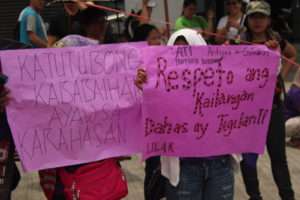
During the 2017 State of the Nation Address (SONA) protest, indigenous women carried banners that read (from left to right): “Katutubong kababaihan, ayaw sa karahasan” (Indigenous women are opposed to violence) and “Respeto ang kailangan; dahas ay tigilan!” (Respect is what we need; end violence!). Nearly two years later, their calls remain the same. Quezon City, Philippines. 2017 July 24. Photo by Galileo de Guzman Castillo.
Meth: What is alarming about Duterte is how he disregards, disrespects, and devalues human rights and democratic institutions. By doing so, he effectively weakens the women’s movement, given that human rights are the very basis of our struggle. However, what is even more disturbing is how people seem to have become desensitized to the systemic violence and disregard for the rule of law perpetrated by the administration. This is evidenced by how the majority of Filipinos chose to remain silent when De Lima was jailed, and when an official House probe on her alleged connection to the New Bilibid Prison drug trade was unnecessarily used to expose and mock even the most private details about her relationship with her driver. Now, the majority of Filipinos still choose to remain silent even if thousands have already died under the administration’s bloody war on drugs.
Precy and Melay: Duterte’s misogyny is not just limited to his pronouncements; rather, it also ties in with his tyrannical style of governance. His targeted attacks against strong female figures who are critical of the administration—such as his vulgar comments towards Leni Robredo, his joke about showing Leila de Lima’s alleged sex tape to Pope Francis, and his allies’ legal maneuvers to oust Maria Lourdes Sereno and arrest Maria Ressa—are reflective of his deliberate patriarchal strategy of subduing and debilitating women who muster the courage to fight back against his tyrannical government. Clearly, the end goal of this strategy is to instill a culture of silence among women in order to easily contain them in spaces where the patriarchal system believes they should remain.
Precy: Aside from Duterte’s assault on women, his tyrannical style of governance also involves red-tagging the opposition, circumventing if not deliberately assailing democratic institutions, and spreading fake news and other forms of propaganda against the opposition. Duterte’s tyrannical rule can elicit two possible responses from women. First, by pushing women to the wall, they will be forced to speak out against the administration. However, this is not the case for everyone. In fact, a lot of women are now afraid to speak out because of the administration’s use of brute force against anyone who strongly opposes its policies and style of governance. This is especially true in Mindanao where Martial Law continues to be imposed. A lot of women in that region now find it difficult to escalate their issues to concerned government institutions given that the military, which is supposed to protect the people, is itself the perpetrator of crimes and violations of human rights.
In sum, Duterte’s tyrannical style of governance has compounded the difficulty of women’s struggle for emancipation by diminishing the spaces where they can struggle and resist, delegitimizing the problems they endure, and emboldening the administration’s equally misogynistic supporters to harass those who advocate women’s rights and speak out against the government.
Melay: Duterte’s macho and dictatorial style of governance derives its legitimacy from the dominant patriarchal system that shapes most of our society’s norms and values. So as long as the patriarchal system prevails, this style of governance will continue to be normalized, and women can never have meaningful participation. The difficulty with challenging Duterte’s style of governance, however, is that it reinforces the very system that gives it power – essentially, there’s a vicious cycle of reinforcement between the patriarchal system and Duterte’s style of governance. Therefore, challenging the latter would necessitate criticizing the former as well.
Bianca: Given your assessment of Duterte’s style of governance and policies and how these have negatively affected women, what do you think should be the elements of a progressive women’s agenda that we can forward as an alternative to Duterte’s agenda?
Che: The progressive women’s agenda should be inclusive in that it should recognize and address not only the gender-based issues confronting women—such as violence against women, sexual harassment, rape—but also the multiple other burdens they bear as part of other marginalized groups—for instance, the indigenous women’s struggle for their right to self-determination.
In terms of the actual elements of the progressive women’s agenda, perhaps one of the most essential is a democratic and non-patriarchal style of governance. Democratic in the sense that it should provide spaces for women—especially poor women—to participate in and engage with traditional institutions of governance to advance their rights, interests, and demands. In the case of indigenous women, this would mean strengthening the Indigenous Peoples Mandatory Representation (IPMR)[6] and making it more inclusive to women considering that they are not allowed to participate in the IPMR system in some provinces. Second, this governance should not be rooted in patriarchal ideologies that view femininity as a weakness and, beyond the gender framework, justify oppressive power relations.
Ana, Alyssa, and Marian: As far as rural women are concerned, the elements of the progressive agenda should include:
- First, the fulfillment of rural women’s property rights in agrarian reform, ancestral domains, and coastal resources. The problem with the current land ownership system is that it is very exclusionary to women, given that land rights can only be directly held by men, whereas women only have indirect access through a male relative. This unjust system endures despite women’s significant contribution to food production, farm labor, and, on top of everything else, the management of the household.
- Second, rural women should also have secure access to basic services, social protection, safe and adequate food, and rights to fair wages and just conditions of work.
- Third, unpaid care work—which refers to all unpaid services often provided by women within a household for its members—should be recognized as legitimate work, given that it significantly contributes to the operation not just of the home but of society at large. Indeed, much of what we do outside our homes would not have been possible if our homes had not been properly managed in the first place. Furthermore, the burden of care work, which is often assumed by women, should be reduced and redistributed to other members of the family. Homeworkers should also be provided with spaces for political representation where they can raise their concerns and advance their rights.
- Fourth, rural women should have access to sustainable and women-friendly agriculture and fishery support services. The problem is that most of the time, these support services only cater to men, as agricultural and fishery work are often perceived as men’s jobs. This should not be the case, as rural women also significantly contribute to the operations of farms and fisheries.
- Fifth, they should have representation and participation in the implementation of gender and development programs so that they can contribute in important decision-making processes and directly propose the services they need.
- Sixth, rural women should be able to fulfill their reproductive rights and be protected from all forms of violence and other oppressive relations.
- Seventh, they should participate in the creation and fulfillment of the peace agenda, especially in Mindanao. At present, women are often excluded from negotiating tables despite their critical contributions to preventing and resolving conflict. This is a cause for concern, as women’s exclusion in negotiations would mean that the resulting peace agenda would probably not be able to address their issues.
- Eighth, rural women should be protected from the impacts of climate change and their rights to a safe environment upheld. More often than not, women—especially poor women—bear the heavier impact of climate change-induced disasters. By worsening their indigence and destroying their livelihoods, natural disasters make women more vulnerable to sex trafficking and other forms of exploitation especially when they are relocated to unsafe evacuation centers.
- Lastly, young girls should also be protected, and their rights must be fulfilled. Because children’s minds are not yet fully developed, they are easier to manipulate and are thus more prone to exploitation. The risk is especially high for children who come from poor families. For this reason, PKKK has collectively decided to include this element in the rural women’s agenda.
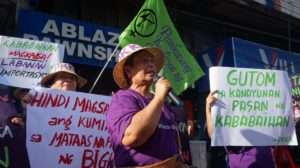
“Gutom sa kanayunan, pasan ng kababaihan.” (Hunger in the countryside, a burden to rural women). International Day of Rural Women. Quezon City, Philippines. 2018 October 15. Photo by Ana Dominique Pablo.
Bianca: How can we advance this progressive agenda within and beyond the context of the 2019 elections?
Christine: Within the context of the 2019 elections, we have to encourage Filipino voters—especially women, who comprise more than half of total voters—to defend democracy and stand up against tyranny by voting for the opposition in the Senate so that they can block Duterte’s anti-poor and authoritarian policies, most notably the push for federalism through Charter Change (Cha-Cha).
Che: We need to acknowledge that it would be very difficult to advance one cohesive progressive women’s agenda given that there are a lot of divisions within the movement. There are people who claim to champion women’s rights but only stand up against gender-based issues—such as violence against women and unequal pay—while disregarding class-based issues. Even worse, there are women’s rights activists who are only concerned with advancing the political and economic interests of women from political elites and the capitalist class. And even in the broader spectrum of progressive social movements, there are still a lot of activists who are not cognizant of and proactively responsive to women’s issues and struggles. As such, before we can hope to advance a truly progressive agenda, we first have to identify the truly progressive individuals and groups within the movement who will grapple not just with the gender-based but also the class-based issues confronting women.
Another action we can take to advance the agenda is to engage with the youth and involve them in the movement. We need younger activists whose participation in social movements is motivated by their pure desire to engage with grassroots communities and work with them in challenging and changing the oppressive political, social, and economic systems. In this regard, perhaps we can get the youth involved by coming up with a strategic, efficient, and contemporary way of organizing them that will appeal to their sensibilities.
Lastly, in the case of indigenous women, they need to be equipped with the necessary skills to prepare them to take on leadership roles whether in mainstream systems of governance or traditional indigenous political systems through which they can represent and advance the collective interest of indigenous peoples.
Meth: Before we can hope to advance the progressive women’s agenda, we first have to strengthen the social movement that will vigorously push it forward. This movement should consist of activists who truly understand the issues and problems confronting women and strongly aspire to challenge and transform the social structures that perpetrate the oppression of women. In order to mold these kinds of activists, we need to employ the pedagogy of conscientization, which involves developing women’s minds to make them more critical of the unequal and unjust conditions they are made to endure by the oppressive political, social, and economic systems governing them. However, conscientization is not just a one-way teaching process where only the members of civil society groups can educate and politicize women in grassroots communities. Through our immersion with them, they are also able to educate and politicize us by unfolding for us the many layers of oppression experienced by women. As such, only through the immersion process will we be able to truly understand what they are going through, adopt their aspirations as our own, build our passion, cultivate our commitment, and find a meaningful advocacy to which we can commit our life.
However, aside from cultivating knowledge and making meaningful engagements, the women’s movement should also be founded on a culture of sisterhood and comradeship among women’s rights activists, as this would give strength and cohesion to the movement. Therefore, beyond teaching and learning from women from grassroots communities, we should also build authentic and meaningful personal relationships with them.
Precy: Given that the Duterte administration is misogynistic to its core, we cannot expect it to be receptive to the progressive women’s agenda. What we need in the longer term is a different administration or, at the very least, a government that is not dominated by the administration’s allies. This does not mean, however, that we will completely rely on the government for the advancement of the agenda. On our part, we can also push it forward through the implementation of political education programs that seek to develop unorganized women communities’ gender sensitivity and deepen their understanding of women’s issues, starting with those that directly affect them (unstable livelihood, violence against women, sexual harassment). At the end of the day, the advancement of the women’s agenda still relies on a strong women’s movement which, in turn, can be organized by constantly raising women’s awareness of the multi-layered oppression that we endure and encouraging them to partake in the movement.
Melay: Considering that our social institutions play an important role in the perpetration of misogynistic ideas that hamper the advancement of the progressive women’s agenda, we need to reassess the values we propagate through our schools, our families, our workplaces, and all other social institutions. Aside from this, women have to make themselves and their demands more visible by organizing a united front, expanding our membership, and doing more grassroots political education. However, at the same time, we also need to look out for one another given that the Duterte administration is very vindictive towards human rights and women’s rights activists.
Perhaps the main challenge to strengthening the women’s movement—or any progressive movement for that matter—is that we are not perceived as the legitimate alternative. Rather, it is the Duterte administration that has successfully presented itself as the alternative—particularly to elite politics—to the majority of Filipinos. This is why many Filipinos across all social classes rallied behind Duterte out of their frustration with elite-dominated politics. Therefore, in order for us to be viewed as the legitimate alternative, we need to engage with the masses and make them understand our struggle and what we are standing up against.#
_________________
[1] Tendayi Viki et al., “The effect of sexist humor and type of rape on men’s self-reported rape proclivity and victim blame,” Current Research in Social Psychology 11, no. 10 (December 2007): 128, https://www.researchgate.net/publication/237222999_The_effect_of_sexist_humor_and_type_of_rape_on_men’s_self-reported_rape_proclivity_and_victim_blame.
[2] Tax Reform for Acceleration and Inclusion
[3] See “Duterte 2 Years on: Destructive, Divisive, and Despotic,” Focus on the Global South, August 1, 2018, https://focusweb.org/duterte-2-years-on-destructive-divisive-and-despotic/.
[4] Teresa dela Cruz is an indigenous woman leader from Zambales province.
[5] English translation: “How powerless does this government want us to be? The president’s misogynistic remarks have already increased our vulnerability; now they are even using institutions and policies to attack women.”
[6] The IPMR is a political structure that mandates the representation of indigenous peoples in policy-making bodies and other local legislative councils.

